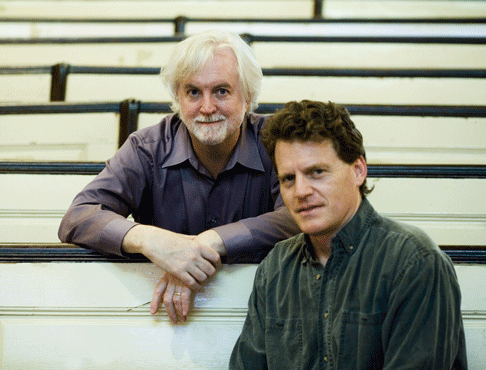31 Mar 2012
Elmer Gantry the Opera
The novels of Sinclair Lewis once shot across the American literary skies like comets, alarming and fascinating readers of that era, but their tails didn’t extend far behind them.

The novels of Sinclair Lewis once shot across the American literary skies like comets, alarming and fascinating readers of that era, but their tails didn’t extend far behind them.
His best novels came relatively early, a string of successes climaxing with the Nobel Prize for literature — the first won by an American — after Dodsworth. He continued to produce novels until his death a couple decades later; they are mostly forgotten, and even his best work merits little discussion today. His themes of the banality and hypocrisy of American middle class mores haven’t exactly lost their relevance, but they seem obvious and forced. It’s interesting that, according to Richard Dyer’s excellent booklet essay, the inspiration for composer Robert Aldridge and librettist Herschel Garfein’s operatic adaptation of Elmer Gantry came while watching the 1960 film version. The cinematic version, with its Academy Award-winning performance in the lead by Burt Lancaster, at least retains Technicolor vividness.
The story of Elmer Gantry has a picaresque quality, as we follow a brash young athlete who, almost by accident, finds himself on the path to becoming a successful Evangelist, all the while pursuing his own need for female companionship and ego-building applause. The rather labored ironic ending finds Gantry leaving behind, if not in the dust then in the ashes of a fire, those who had helped him reach his goals, and moving onto to a vaguely “New Age” type religious re-birth. In another booklet essay, Leann Davis Alspaugh quotes the great line from H. L. Mencken that “deep within the heart of every evangelist lies the wreck of a car salesman.” Those relatively few pithy words put across the thrust of Elmer Gantry, at least as an opera. Over two hours of accomplished, professional composition and literary adaptation belabors the point at excessive length.
However, there is much to commend in the work of Aldridge and Garfein. In particular, Aldridge finds ways to use creative orchestration to give momentum and a sense of variety to a score that mostly builds upon the comparatively unsophisticated sounds of gospel music. There are hints of Copland from time to time, or perhaps one of Virgil Thompson’s documentary film scores. The problem is that when it comes time for an aria, that inspiring breath of original melodic inspiration that is found in the great operas of the standard repertory evades Aldridge. Nevertheless, when a booklet essay writer notes that the opera has already found a niche for itself at American music colleges as a fine piece to stage for aspiring singers, it’s clear that the sheer craftsmanship of Elmer Gantry the opera has earned it a kind of success.
 Composer Robert Aldridge and librettist Herschel Garfein [Photo by Jane Kung]
Composer Robert Aldridge and librettist Herschel Garfein [Photo by Jane Kung]
The Naxos recording, made before an enthusiastic live audience, benefits from the strong leadership of conductor William Boggs over the Milwaukee Symphony Orchestra and the Florentine Opera Chorus. In the title role, Keith Phares offers the kind of smooth baritone reminiscent of Nathan Gunn — a handsome sound without much character. In the somewhat superfluous role of Gantry’s best friend Frank, Vale Rideout strains a bit at the high end. Patricia Risley sings the lead female role of Sister Falconer, a female evangelist who is actually more interesting as a character than Gantry. Like Phares, Risley’s seems to have adopted a vocal production arguably closer to Broadway than to an opera stage, and a little more thrust and edge would have been good. In the role of a pathetic husband that Gantry cuckolds, Frank Kelley gets a manic mad scene that should go over very well for budding character tenors looking for competition pieces in English.
Naxos manages to provide a slim booklet with informative essays, production stills, and the libretto in English. On the debit side, Naxos doesn’t provide much tracking, with the long act one, for example, on CD 1 with only 6 tracks. Although your reviewer will reserve judgment on whether Elmer Gantry the opera belongs in a CD series called “American Opera Classics,” it is an honest and finely assembled piece that makes a strong case for itself. The same cannot necessarily be said for many American operas of the last decades with higher profiles.
Chris Mullins
[Editor’s Note: Elmer Gantry received two Grammy Awards for Best Contemporary Classical Composition and Best Engineered Album, Classical at the 54th Annual Grammy Awards (2011)]